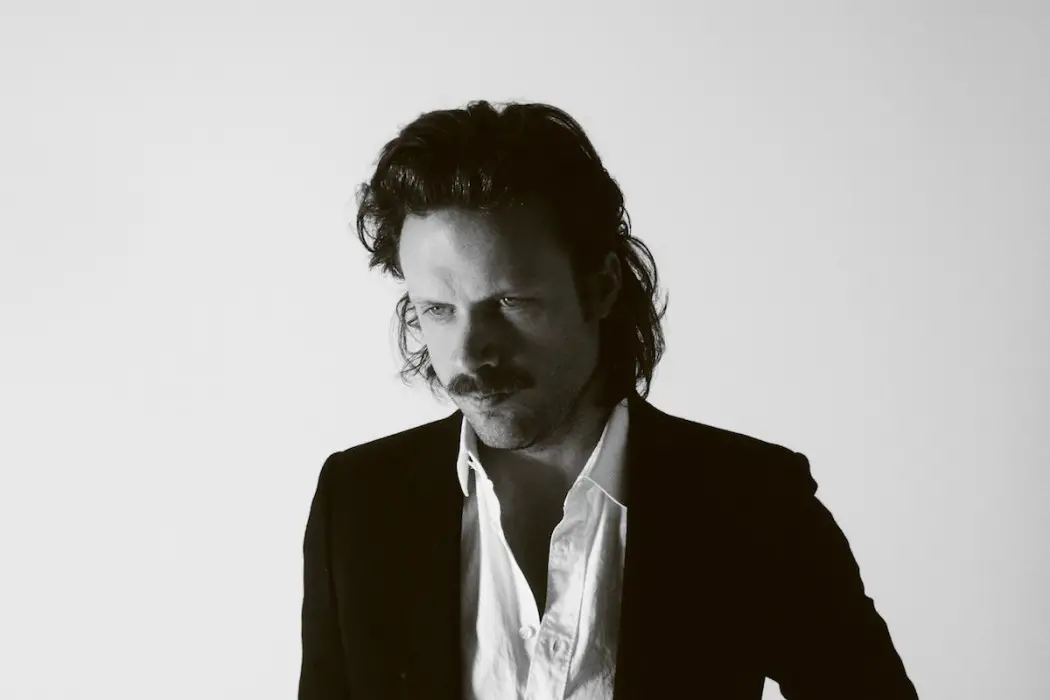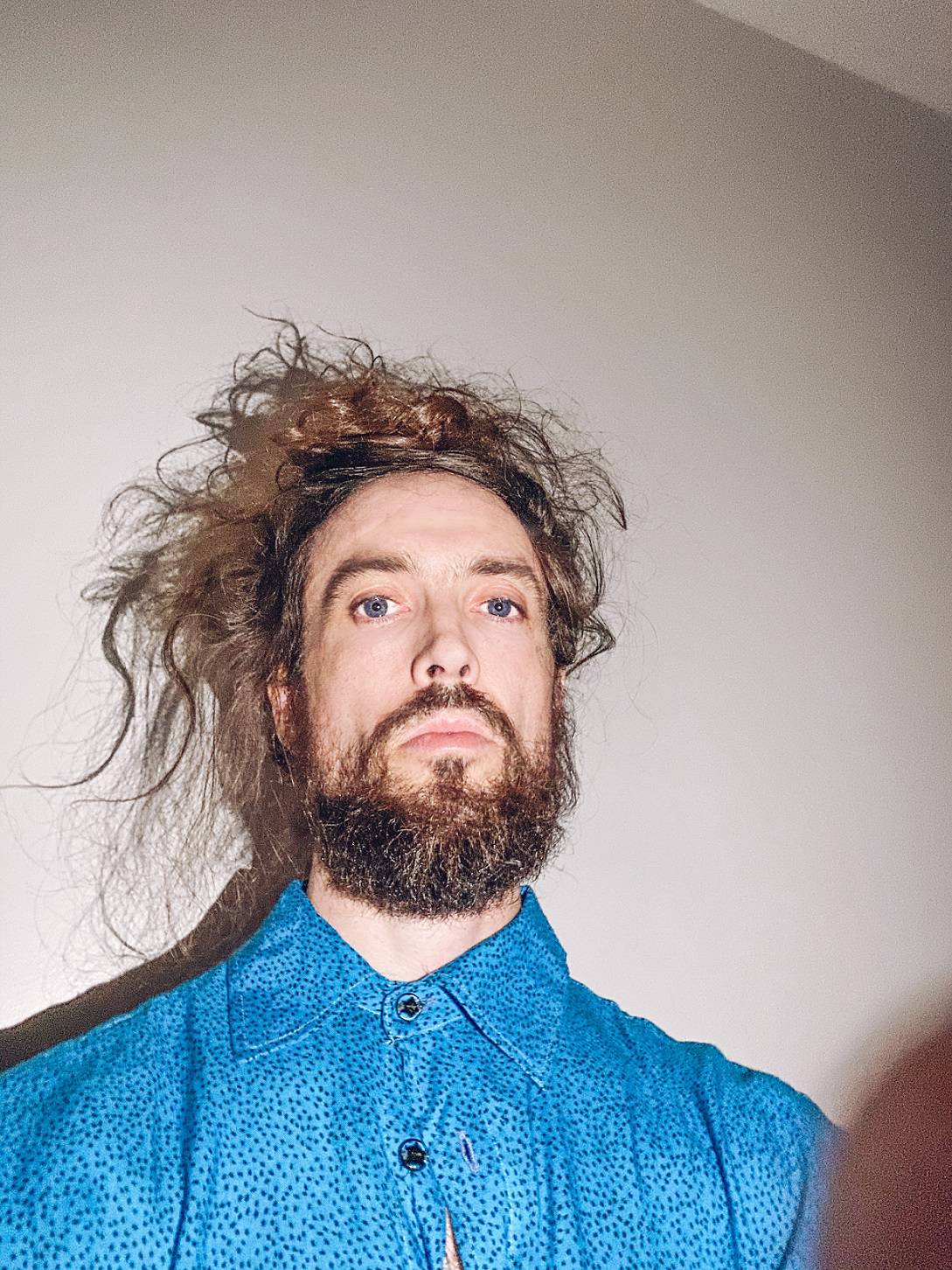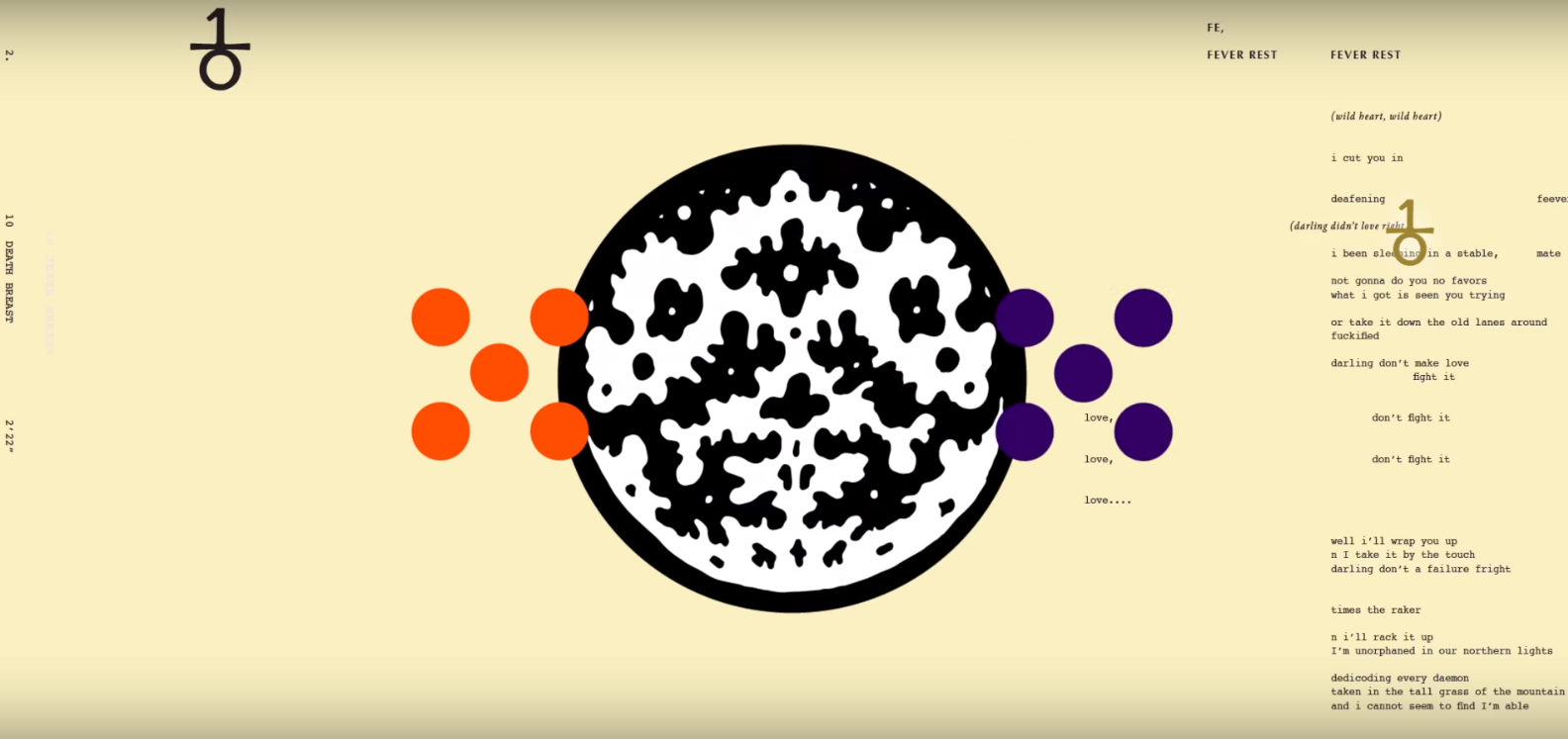The comedy of man starts like this…
CO•ME•DY (kom-i-dee) noun: humorous entertainment; the comic quality or amusing element in something; a literary genre and type of dramatic work that holds a mirror up to society to reflect its follies and vices (1) | synonyms: farce, absurdity, satire, humor, fun
Josh Tillman could have started his third Father John Misty album by justifiably singing, “The tragedy of man starts like this,” but comedy says so much more: Human beings are utterly ridiculous – tragic to the point of comical, especially to a bitter cynic at his wit’s end. Pure Comedy (released 4/7 via Sub Pop) is a dark and biting satire, yet even then, it takes a considerably morbid, vitriolic mindset to find sincere amusement in the state of human affairs that serves as Pure Comedy‘s backdrop: From politics and religion to materialism, entertainment and self-absorption, Father John Misty confronts what he views as the pitfalls of society and the undoings of mankind on his lyrically dense, exceptionally thought-provoking pièce de résistance.
Oh comedy, their illusions they have
no choice but to believe
Their horizons that just forever recede
And how’s this for irony,
their idea of being free is a prison of beliefs
That they never ever have to leave
Oh comedy, oh it’s like something that
a madman would conceive!
The only thing that seems
to make them feel alive
is the struggle to survive
But the only thing that they request
is something to numb the pain with
Until there’s nothing human left
Just random matter suspended in the dark
I hate to say it, but each other’s all we got
– Father John Misty, “Pure Comedy”
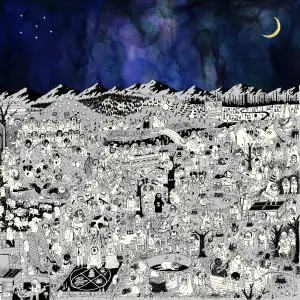
Father John Misty begins with a grandiose overture: The appropriately-titled “Pure Comedy” is his thesis statement, an accounting of humanity’s flaws that introduces several observations and arguments he will touch upon throughout the record. These opening remarks address human beings’ infantile helplessness, gender inequality, religion (and its inherent misogyny), prejudice and discrimination, entertainment’s numbing effects on the populace, corruption, ignorance, and hypocrisy… to name a few. “Just wait until the part where they start to believe they’re at the center of everything, and some all-powerful being endowed this horror show with meaning,” he sings. The musical table of contents prepares listeners for what is to come, both musically and lyrically: Tillman croons a soulful and intimate ballad, his exasperation at his species as evident as the intense care and consideration put into each line: After all, Father John Misty is supposed to be the ultimate provocateur.
“Pure Comedy” – Father John Misty
[youtube=https://youtu.be/wKrSYgirAhc?t=0s]
Thus, Pure Comedy: A 75-minute long record where we can sit back and laugh with Father John Misty as we watch the world burn from an enlightened plateau. Except that, sparing the artist’s occasional wit and clever wordplay, there is no laughter here. Pure Comedy is not a very “fun” album; a brooding melancholia shrouds songs like “Things That Would Have Been Helpful to Know Before the Revolution,” “Birdie,” “Leaving LA,” and indeed most of the expansive record in pensive gloom. The bright, romantic melodies and rich harmonic structures that canvased Father John Misty’s last record – 2015’s critically-acclaimed I Love You, Honeybear – are notably absent on Pure Comedy, leaving in their wake a litany of tired folk patterns whose delicate harmonies seem often to exist primarily as a means of keeping us awake while Tillman reads sings from his Long List of Grievances.
When asked about this by a reporter for Rolling Stone, Josh Tillman was quick with a response:
“There’s a difference between art and entertainment. Entertainment is really about forgetting about your life, and art is about remembering your life. Sometimes remembering your life involves stronger emotions than the narcotic glow of entertainment. Jimmy Fallon is a fucking entertainer. What I’ve set out to do is more than to just entertain.“
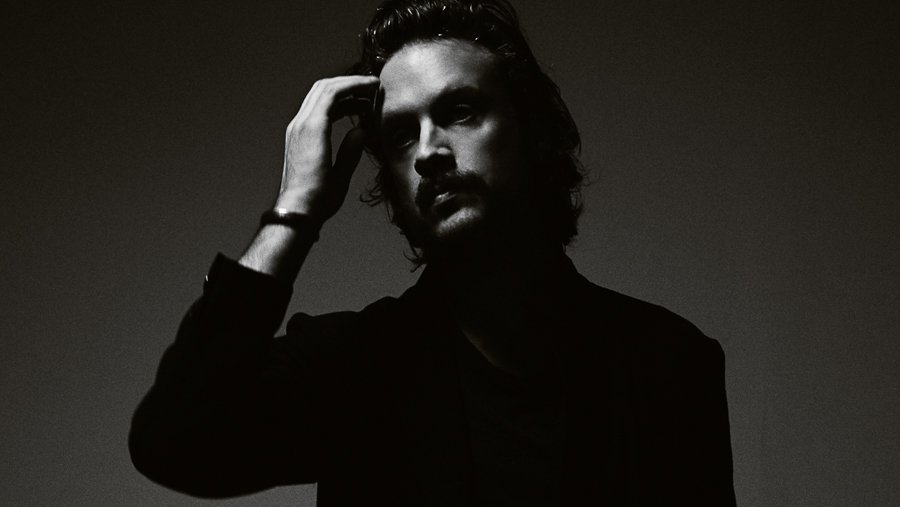
Pure Comedy is somber; its colors are muted, but it is still fertile with emotion – it just presents a different cocktail of feelings than we’re used to dwelling in. No, it’s not a “fun” album, but it’s a record that had to be made. Father John Misty’s assertion neglects to address the fact that, in lacking a captivating energy, his art potentially loses audience attention and therefore fails to accomplish its primary goal (of being heard). Or maybe he just makes music for himself, and we should stop fooling ourselves? No, he made this one with the intention of making some noise. Tillman doesn’t let anything stand in the way of his message: Flowery orchestration might have shrouded the importance of Father John Misty’s words, which are paramount at this particular impasse.
Dance like a butterfly and drink like a fish
If you’re bent on taking demons down
with only your fist
And I’ve never known anyone who could
lose himself in a bigger paper bag
The weaker the signal, the sweeter the noise
Hunching over an instrument that you now employ
Like the Starvation Army needs
a marching piano in the band
Are you feeling used?
I do
– Father John Misty, “A Bigger Paper Bag“
None of this makes Pure Comedy any easier to endure, but its insights are worth the heavy listening experience that one collaborator referred to as a “Trojan horse of emotional content.” Tillman reportedly gave up alcohol, cigarettes, drugs, and meat in order to hone in on these huge topics with as clear a head as possible, and it paid off in lucid, on-point commentary that hits home on all fronts.
Tillman has something to say about nearly everything, and while his songs are often scatterplots of allusions and literary references, he manages to present cogent, well-constructed arguments on every song. “Two Wildly Different Perspectives” examines the increasing polarization of politics in the United States, whilst “When the God of Love Returns There’ll Be Hell to Pay” criticizes Christianity for its hypocrisies and shortcomings. The hauntingly sweet “Birdie” aspires for a better tomorrow through a supposed conversation between Tillman and a little winged creature:
Some dream of a world written in lines of code
Well, I hope they engineer out
politics, romance, and edifice
Two outta three ain’t bad
Some envision a state governed by laws of business
Merger and acquisition
instead of violence or nations
Where do I sign up?
Boasting the unforgettable lyric, Bedding Taylor Swift every night inside the Oculus Rift, “Total Entertainment Forever” paints an ominous picture of a not-so-distant future, where entertainment addiction proves to be our downfall:
When the historians find us we’ll be in our homes
Plugged into our hubs
Skin and bones
A frozen smile on every face
As the stories replay
This must have been a wonderful place
“Total Entertainment Forever” – Father John Misty
[youtube=https://youtu.be/J3mfC14MVsM?t=0s]Father John Misty’s songs have a tendency to get caught up in themselves, but no matter how deep they go down the rabbit hole of outrage and cynicism, they inevitably end in vulnerability and grief. On “Pure Comedy,” he concludes, “I hate to say it, but each other’s all we got.” On “God of Love,” he notes, “We just want light in the dark, some warmth in the cold.” That ending technique proves especially evocative on the poignant “Ballad of the Dying Man,” where Father John Misty critiques the critic:
(first verse)
Naturally the dying man wonders to himself:
Has commentary been more
lucid than anybody else?
And had he successively beaten back the rising tide
Of idiots, dilettantes, and fools
On his watch while he was alive
Lord, just a little more time
What he’d give for one more day
to rate and analyze
The world made in his image as of yet
To realize what a mess to leave behind
(final verse)
Eventually the dying man takes his final breath
But first checks his news feed
to see what he’s ’bout to miss
And it occurs to him a little late in the game
We leave as clueless as we came
From rented heavens to the shadows in the cave
We’ll all be wrong someday
“Ballad of the Dying Man” – Father John Misty
[youtube=https://youtu.be/QVaafph6HSQ?t=0s]
Tillman eloquently plays the part of both onlooker and participant: He is a self-aware philosopher, predisposed to both self-indulgence and self-contempt. The 13-minute, 10-verse ballad “Leaving LA” is the perfect example of this dual nature in action, finding Father John Misty diving deep into personal territory while taking a stark, harshly critical look at himself. “Oh great, that’s just what we all need: Another white guy in 2017 who takes himself so goddamn seriously,” he sings. “I’m merely a minor fascination to manic virginal lust and college dudes.”
His humor is dark, but it’s easier to connect to a man who hates himself than a man with an inflated ego. Father John Misty’s self-deprecating lyrics humanize him: He’s not this far-fetched character that bloggers and indie-heads have made him out to be, but rather, he’s one of the people: Flesh and bone, born to die.
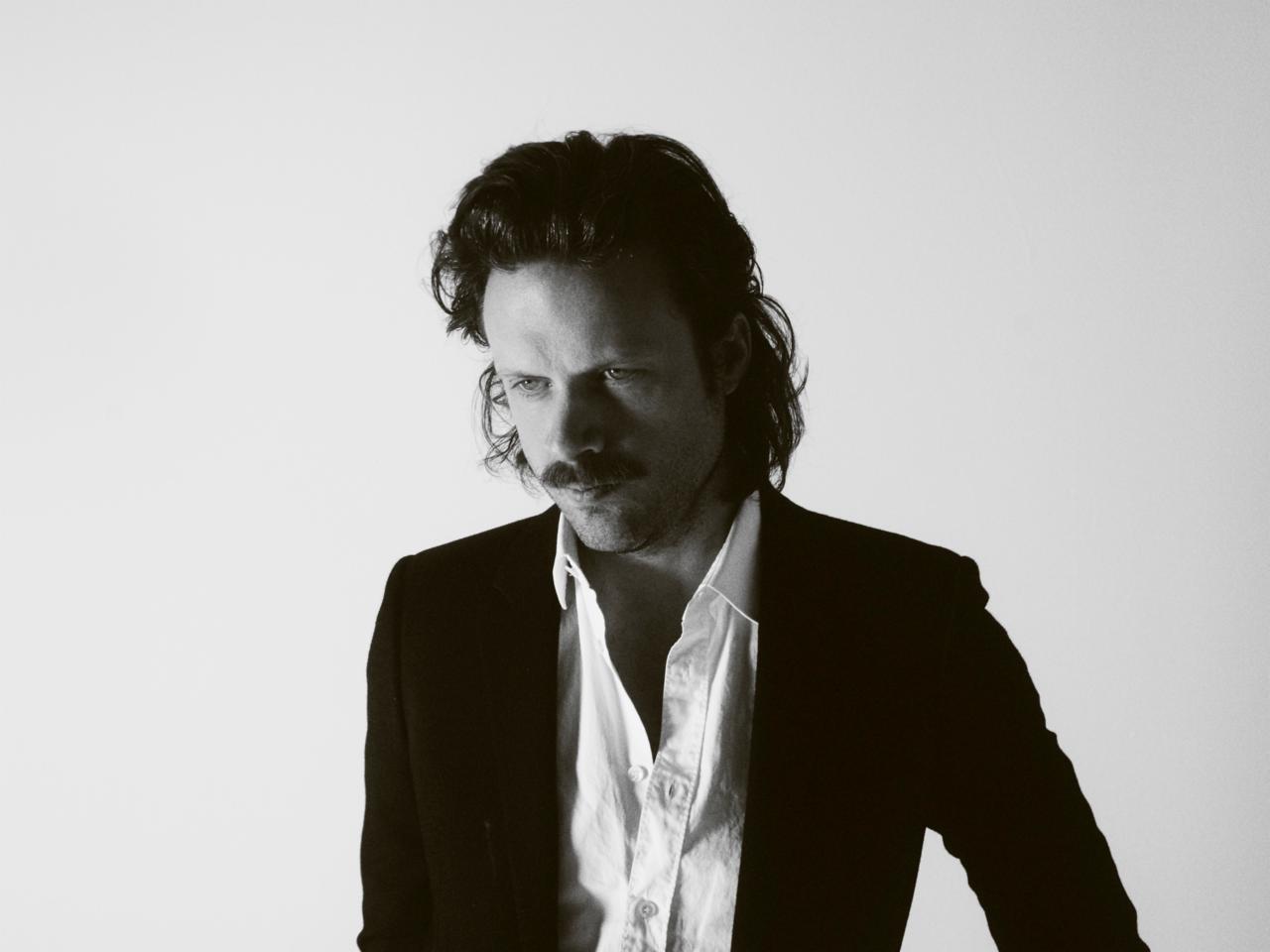
Pure Comedy‘s final scene, “In Twenty Years or So,” brings the comedy/tragedy home with introspective reflections on cosmic indifference – a nihilist notion that nothing, including this album, matters in the grand scheme of things. “And what’s to regret for a speck, on a speck, on a speck, made more ridiculous the more serious he gets?” cries Tillman. A beautifully-scored orchestral movement ushers in a new, lighter, warmer atmosphere:
Oh, I read somewhere
That in twenty years
More or less
This human experiment will reach its violent end
But I look at you
As our second drinks arrive
The piano player’s playing “This Must Be the Place”
And it’s a miracle to be alive
For the first time on Pure Comedy, Father John Misty feels truly relaxed and at ease. He revels in a simple moment of bliss, holding it close and allowing himself, if ever so briefly, to forget his existential crises: “There’s nothing to fear,” he repeats like a mantra. As the strings swell, they evoke an emotion that’s been relatively absent for much of this album: Love. The comedy of man ends on a high note.
Pure Comedy may be challenging at times, but it is overwhelmingly worth the effort: Father John Misty’s album is among the most substantial and powerful critiques of our society. Father John Misty pleads for us to change our ways before it’s too late; his thoughtful observations, well-articulated opinions, and provocative imagery lay the framework for an intelligent discussion about today’s most urgent affairs.
For all our masturbatory talk of enlightened minds, technological advancements and scientific achievement, we Homo sapiens have a lot of issues to sort out – and the clock is ticking.
Pure Comedy is available on physical & digital
read Father John Misty’s ‘Pure Comedy‘ essay
— — — —

Connect to Father John Misty on
Facebook & Twitter
Discover new music on Atwood Magazine
Pure Comedy
by Father John Misty
cover © Guy Lowndes

